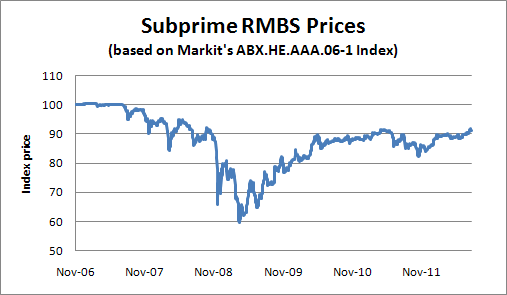“I simply love the mortgage market. It’s the best place to be right now.”
-Steve Kuhn, Pine River’s mortgage chief, at the 2012 SALT Conference
Absolute Return and Alpha: Hedge Fund Firms are piling into the MBS market and putting up lofty returns, but high risks remain:
“Cerberus Capital Management, Pine River Capital Management and Canyon Partners are among dozens of firms to earn market-beating returns this year by investing in mortgage backed securities. The MBS strategy they employ has become, almost by default, the most attractive in the hedge fund industry.
Hedge funds that employ an MBS strategy are up an average of 6.43% through June, according the AR database, beating all other strategies tracked by the database and compares to a composite return of 2.65%.
The question is how long those lofty returns can last . . .”
Absolute Return and Alpha:
“There is about $8.9 trillion in total outstanding mortgage debt structured in securities as of the end of the first quarter, according to data compiled by Securities Industry and Financial Markets Association. That includes about $1.4 trillion in non-government agency residential and commercial mortgage backed securities (down from nearly $2.4 trillion in 2007) and about $7.0 trillion in agency MBS and collateralized mortgage obligations from Fannie Mae, Freddie Mac and Ginnie Mae (up from about $5.8 trillion in 2007).
The subprime mortgage securities at the center of the 2008 market dislocation have rallied since their dramatic sell-off but not fully recovered to peak 2007 prices.
Hedge funds have been snapping up all types of RMBS AND CMBS: prime and subprime, agency and non-agency. The prevailing view is that the U.S. is in the early stages of a housing market resurgence . . .”
Big returns, hidden volatility?
“There’s a lot of hidden risk in mortgage focused hedge funds,” said Raphael Douady, co-founder and research director of Riskdata, a data and software firm that tracks hedge fund returns and evaluates risk for clients. Douady said MBS managers have relatively smoother returns either because they consistently apply a conservative methodology or are too optimistic in valuing their relatively illiquid positions. That creates seemingly low volatility relative to other hedge fund strategies, which can trick investors into a false sense of security. “There’s a tendency to produce small, positive returns because of valuation flexibility, whether by active smoothing or simply conservative marking. But when the spread widens dramatically because of a big event in the market, it can cause a crash.”
“There is no easy or perfect hedge for MBS funds,” says Zilberchteine of DGAM. “But we like managers who actively hedge to minimize impact from substantial underperformance in the housing market or broader economy. You can be the best security picker in the world and still have the markets crush you.”

Markit’s ABX.HE.AAA.06-1 is a tradable credit default swap index that references a basket of 20 subprime RMBS bonds originally rated AAA that were issued to market in 2005. As the index prices in the chart fell, the cost of purchasing CDS as insurance against further losses increased.
Source:
Absolute Return and Alpha
by Lawrence Delevingne
July 31, 2012



What's been said:
Discussions found on the web: